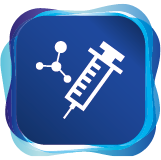 |
CCST9006 Science, Technology and Big Data
|
CCST9011 Biotechnology − Science and Impacts
[This is a certified Communication-intensive (CI) Course which meets all of the requirements endorsed by HKU’s Senate, including (i) the teaching assessment of written and visual communication ‘literacies’; and (ii) at least 40% of the course grade is assigned to communication-rich assessment tasks.]
Course Description
Unveiling the mystery of the “grand design” of the human body has been a formidable challenge to even the best talents. With the recent rapid developments in health technologies, many aspects of human health can now be addressed in ways that are simply unimaginable even in the recent past. In this course, we will examine how such “biomedical miracles” have offered us huge promises, but at the same time also have created new challenges that could be perhaps potentially perilous. We will see how humans are increasingly being involved or confronted with a problem of a startling scale whereby promises and perils arising from new biomedical discoveries are found to be fueling each other to grow, that can be likened to solving a very peculiar puzzle whereby finding the first piece of the puzzle immediately makes it more difficult to identify the next piece.
Such an interesting phenomenon will be vividly illustrated by examples found in the application of knowledge of the human genome, organ transplantation, antibiotics, and cell communications. Learning in this course adopts an interactive, multi-activity, student-centered and inquiry-based approach with the close assistance and attendance of tutors. Experiential learning is a main feature of this course so as to stimulate and to expand those core intellectual skills on which learning depends. On the completion of this course, students are expected to acquire transdisciplinary vision on real-life problems/matters in which biomedical science is a major constituent.
[Lectures and tutorials will be held in an integrated manner each week on Wednesday from 16:30 – 19:20. Learning is conducted by a variety of ways: short lectures, video viewing, in-class exercises, small group discussions, etc.]

Learning Outcomes
On completing the course, students will be able to:
- To acquire better skills of asking questions as the core attribute/ability underlying any form of effective communications.
- Describe how major biomedical discoveries have improved human health globally through elucidation of the basics of disease mechanism, diagnosis and treatment.
- Critically evaluate the significance of biomedical discoveries in terms of their social and ethical implications.
Offer Semester and Day of Teaching
First semester (Wed)
Study Load
| Activities | Number of hours |
| Lectures (incl in-class exercises) | 24 |
| Tutorials | 12 |
| Reading / Self-study | 100 |
| Total: | 136 |
Assessment: 100% coursework
| Assessment Tasks | Weighting |
| In-class assessment | 22 |
| Online discussion | 13 |
| Group work | 5 |
| Poster presentation | 30 |
| Reflective writing | 30 |
Required Reading and Viewing
- Aguirre S. (2018). The Power of Questions. From https://www.youtube.com/watch?v=5K842cXNlEI
- Bobrow, M. (2011). Opinion: Animals with Human Material. The Scientist. From https://www.the-scientist.com/news-opinion/opinion-animals-with-human-material-41916
- Cheng, H. (2020). The Problem with Direct-to-Consumer Genetic Tests. Scientific American. From https://blogs.scientificamerican.com/observations/the-problem-with-direct-to-consumer-genetic-tests/
- Mock, J. (2020). How Antidepressants Work Is a Mystery Scientists Still Don’t Understand. Discover Magazine. From https://www.discovermagazine.com/health/how-antidepressants-work-is-a-mystery-scientists-still-dont-understand
- Moulthrop, D. (2015). The Art Of Asking Questions. From https://www.youtube.com/watch?v=hZSY0PssqH0
- Nobel Prize Outreach AB. (2021). Nobel Prizes and the Immune System. NobelPrize.org. From https://www.nobelprize.org/prizes/uncategorized/nobel-prizes-and-the-immune-system
- Senthilingam, M. (2020). Outbreaks and Epidemics: Battling Infection from Measles to Coronavirus. Icon Books Ltd. [Chaps. 1-4, 6, 7]
- Spinney, L. (2020). Your DNA is a valuable asset, so why give it to ancestry websites for free? The Guardian. From https://www.theguardian.com/commentisfree/2020/feb/16/dna-hugely-valuable-health-tech-privacy
- Vaughan, M. (2015). How to Ask Better Questions. From https://www.youtube.com/watch?v=J8xfuCcXZu8
- Vogt, E. E., et. al. (2003). The Art of Powerful Questions: Catalysing Insight, Innovation and Action. Whole Systems Associates. [Available in Course Moodle Site]
- Wayne, M. L. (2015). Infectious Disease: A Very Short Introduction. Oxford University Press. [Chaps. 1-3, 7]
Course Co-ordinator and Teacher(s)
| Course Co-ordinator | Contact |
| Dr J.W.Y. Ho School of Biomedical Sciences, Li Ka Shing Faculty of Medicine |
Tel: 3917 9495 Email: joannaho@hku.hk |
| Teacher(s) | Contact |
| Dr J.W.Y. Ho School of Biomedical Sciences, Li Ka Shing Faculty of Medicine |
Tel: 3917 9495 Email: joannaho@hku.hk |
| Dr K.M. Yao School of Biomedical Sciences, Li Ka Shing Faculty of Medicine |
Tel: 3917 9275 Email: kmyao@hku.hk |
| Dr N.S. Wong School of Biomedical Sciences, Li Ka Shing Faculty of Medicine |
Tel: 9832 8649 Email: nswong@hku.hk |
| Dr Enoch Chan School of Biomedical Sciences and School of Clinical Medicine, Li Ka Shing Faculty of Medicine |
Tel: 3917 9787 Email: enocha@hku.hk |

